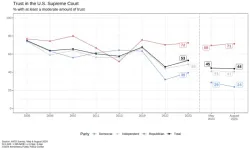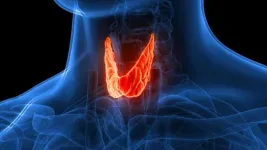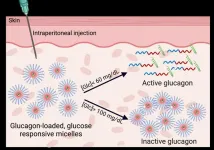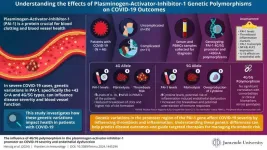(Press-News.org) The American College of Medical Informatics (ACMI) has announced that Chris Harle, PhD, of the Indiana University Richard M. Fairbanks School of Public Health and the Regenstrief Institute will be inducted as one of 25 new fellows on November 10 in San Francisco, CA, at ceremonies during the American Medical Informatics Association (AMIA) 2024 Annual Symposium.
ACMI is a college of elected fellows who have made significant and sustained contributions to the field of biomedical informatics. Individuals who have achieved national recognition in the field and are committed to advancing the charitable, scientific, literary and educational purposed of ACMI are eligible for membership as a fellow. Each year, new fellows are elected by the voting members of ACMI and are elected for life.
“I am deeply honored to be included in this class of fellows,” said Dr. Harle, professor and chair of the Department of Health Policy and Management at the Fairbanks School and a research scientist at the Regenstrief Institute. “This fellowship reflects not just my personal achievements, but also the dedication of my research team members and the supportive environment at the Fairbanks School and Regenstrief. I look forward to continuing to contribute to the transformation of healthcare through informatics.”
Dr. Harle’s research focuses on the design, adoption, use and value of health information systems. Over the last 12 years, his research has focused on clinical decision support tools to aid primary care clinicians in chronic pain care and safe opioid prescribing. This work has led to the Chronic Pain OneSheet decision support system. OneSheet has been implemented at two major health systems, and Dr. Harle is working with the electronic health record vendor Epic to distribute OneSheet nationwide. Dr. Harle has also collaborated on many other studies at the intersection of informatics and health services research.
AMIA’s Annual Symposium is the premier medical informatics event, presenting leading-edge scientific research and more than 100 scientific sessions. The symposium presents work from across the spectrum of the informatics field – translational bioinformatics, clinical research informatics, clinical informatics, consumer health informatics and public health informatics.
The list of the 2024 inductees includes:
Adam Landman, MD, FAMIA, Mass General Brigham
Alexander Alekseyenko, PhD, FAMIA, Medical University of South Carolina
Andrea Hartzler, PhD, University of Washington
Anthony Solomonides, PhD, MSc (Math), MSc (AI), FAMIA, North Shore University Health System Research Institute
Benjamin Goldstein, PhD, Duke University
Christopher Harle, PhD, Indiana University & Regenstrief Institute
Craig Kuziemsky, PhD, MacEwan University
Curtis Cole, MD, Cornell University
Daniella Meeker, PhD, Yale School of Medicine and Yale New Haven Health System
Degui Zhi, PhD, D. Bradley McWilliams School of Biomedical Informatics at UTHealth Houston
Jaideep Vaidya, PhD, Rutgers University
Jiang Bian, PhD, University of Florida
Laurie Novak, PhD, FAMIA, Vanderbilt University Medical Center
Li Shen, PhD, University of Pennsylvania
Marina Sirota, PhD, University of California, San Francisco
Matthew Scotch, PhD, MPH, Arizona State University
Mattia Prosperi, PhD, FAMIA, University of Florida
Meliha Yetisgen, PhD, University of Washington
Metin Gurcan, PhD, Wake Forest University School of Medicine
Rui Zhang, PhD, FAMIA, University of Minnesota
Urmimala Sarkar, MD, MPH, University of California, San Francisco
William Lober, MD, University of Washington
Xiaobo Zhou, PhD, D. Bradley McWilliams School of Biomedical Informatics at UTHealth Houston
Xinxin (Katie) Zhu, MD, PhD, FAMIA, Yale School of Medicine
Yifan Peng, PhD, FAMIA, Weill Cornell Medicine
END
Regenstrief, Fairbanks researcher among 25 fellows to be inducted into American College of Medical Informatics
Chris Harle will be inducted at American Medical Informatics Association Annual Symposium
2024-10-02
ELSE PRESS RELEASES FROM THIS DATE:
Ontario Institute for Cancer Research funding aims to speed the development of new drugs for some of the most common cancers
2024-10-02
October 2, 2024, TORONTO – The Ontario Institute for Cancer Research (OICR) continues to support Ontario drug discovery research by funding high-quality investigations of new therapies for some of the most prevalent pediatric and adult cancers. These projects are tackling substantial challenges in cancer by increasing the effectiveness and availability of immunotherapies, making cancer more vulnerable to chemotherapy and developing a new drug for one of the deadliest forms of childhood brain cancer.
OICR’s Cancer Therapeutics Innovation Pipeline (CTIP) initiative is supporting three research teams ...
Trust in US Supreme Court continues to sink
2024-10-02
PHILADELPHIA – Driven by political partisanship, public trust in the U.S. Supreme Court has continued a downward slide since the court’s 2022 Dobbs decision overturning the Roe v. Wade ruling that established a constitutional right to abortion, according to a new survey by the Annenberg Public Policy Center (APPC) of the University of Pennsylvania.
More than half of Americans (56%) now disapprove of the Supreme Court, saying they trust it either “a little” or “not at all” to act in the best interest ...
Rice’s Biotech Launch Pad to lead commercialization of bioelectrical implant treatment for obesity, type 2 diabetes
2024-10-02
Rice University is part of a multiuniversity research team that has secured an award of up to $34.9 million from the Advanced Research Projects Agency for Health (ARPA-H) to accelerate the development of a bioelectronic implant designed to improve adherence for obesity and type 2 diabetes (T2D) treatment while reducing development and manufacturing costs.
Rice University’s Biotech Launch Pad will lead the commercialization effort for “Rx On-site Generation Using Electronics” (ROGUE), a self-contained, durable implantable device that houses cells engineered ...
Carnegie Mellon to lead development of implantable cell-based bioelectronic devices for patient-specific treatment and disease monitoring
2024-10-02
PITTSBURGH – A Carnegie Mellon University-led team has secured an award of up to $42 million from the Advanced Research Projects Agency for Health (ARPA-H) to accelerate the development of implantable, cell-based bioelectronic devices that deliver patient-specific therapy and monitor disease status, for conditions like hypo- and hyperthyroidism, in real time. This award is part of the ARPA-H REACT program, which supports the advancement of implantable bioelectronic devices to improve patient management of chronic diseases.
Burak ...
Case Western Reserve, Vanderbilt universities to develop incisionless prostate surgery using MRI and robotics
2024-10-02
CLEVELAND—Researchers at Case Western Reserve University and Vanderbilt University are pioneering a new approach to prostate cancer surgery by combining advanced robotics and “low-field” MRI technology.
The research aims to allow highly accurate, patient-tailored prostate cancer surgeries without the need for traditional incisions. This innovative research marks a major step in developing minimally invasive treatments for prostate cancer, with the potential to improve both safety and efficiency for patients.
The project is being funded by a new five-year, $3.7 million grant from the National Cancer Institute, part of the ...
Carnegie Mellon University secures ARPA-H award to improve adherence, lower cost of treatment for obesity and Type 2 diabetes patients
2024-10-02
PITTSBURGH – A Carnegie Mellon University-led team of researchers has secured an award of up to $34.9 million from the Advanced Research Projects Agency for Health (ARPA-H). The funds will fast track a bioelectronic implant that could radically improve treatment options and significantly reduce the cost of care for patients with obesity and Type 2 diabetes.
The award will drive the accelerated development and testing of “Rx On-site Generation Using Electronics (ROGUE),” a bioelectrical device that hosts a “living pharmacy,” consisting of engineered cells that produce biological therapy to treat Type 2 diabetes and obesity. The device will offer continuous, ...
A new injectable to prevent and treat hypoglycemia
2024-10-02
People with diabetes take insulin to lower high blood sugar. However, if glucose levels plunge too low — from taking too much insulin or not eating enough sugar — people can experience hypoglycemia, which can lead to dizziness, cognitive impairment, seizures or comas. To prevent and treat this condition, researchers in ACS Central Science report encapsulating the hormone glucagon. In mouse trials, the nanocapsules activated when blood sugar levels dropped dangerously low and quickly restored glucose levels.
Glucagon is a hormone that signals the liver to ...
Turning plants into workout supplement bio-factories
2024-10-02
It’s important to eat your veggies, but some essential vitamins and nutrients can only be found in animals, including certain amino acids and peptides. But, in a proof-of-concept study published in ACS’ Journal of Agricultural and Food Chemistry, researchers developed a method to produce creatine, carnosine and taurine — all animal-based nutrients and common workout supplements — right inside a plant. The system allows for different synthetic modules to be easily stacked together to boost production.
Plants can be surprisingly receptive when asked to produce compounds ...
Pablo Manavella appointed next Editor-In-Chief of The Plant Cell
2024-10-02
The American Society of Plant Biologists (ASPB) is excited to announce Pablo Manavella will serve as the next Editor-in-Chief of The Plant Cell. The Plant Cell is a leading international society journal that publishes novel research of special significance in plant biology, especially in the areas of cellular biology, molecular biology, biochemistry, genetics, development, and evolution.
Manavella is currently a Consejo Superior de Investigaciones Científicas (CSIC) researcher at the Institute for Mediterranean and Subtropical Horticulture (IHSM) in Málaga, Spain. He is the Principal Investigator in a lab focusing on the intricate mechanisms regulating ...
Unveiling genetic insights: how PAI-1 polymorphisms influence COVID-19 outcomes
2024-10-02
Despite global vaccination efforts, COVID-19 continues to pose significant risks, leading to severe complications and fatalities. These risks are driven by disrupted coagulation, impaired fibrinolysis, which is the process of breaking blood clots, and heightened inflammatory responses. The fibrinolytic system, crucial for maintaining balance within the coagulation cascade, relies on plasmin-mediated fibrin degradation. Plasminogen activators convert plasminogen into plasmin, an enzyme that breaks down ...
LAST 30 PRESS RELEASES:
Jeonbuk National University researchers develop an innovative prussian-blue based electrode for effective and efficient cesium removal
Self-organization of cell-sized chiral rotating actin rings driven by a chiral myosin
Report: US history polarizes generations, but has potential to unite
Tiny bubbles, big breakthrough: Cracking cancer’s “fortress”
A biological material that becomes stronger when wet could replace plastics
Glacial feast: Seals caught closer to glaciers had fuller stomachs
Get the picture? High-tech, low-cost lens focuses on global consumer markets
Antimicrobial resistance in foodborne bacteria remains a public health concern in Europe
Safer batteries for storing energy at massive scale
How can you rescue a “kidnapped” robot? A new AI system helps the robot regain its sense of location in dynamic, ever-changing environments
Brainwaves of mothers and children synchronize when playing together – even in an acquired language
A holiday to better recovery
Cal Poly’s fifth Climate Solutions Now conference to take place Feb. 23-27
Mask-wearing during COVID-19 linked to reduced air pollution–triggered heart attack risk in Japan
Achieving cross-coupling reactions of fatty amide reduction radicals via iridium-photorelay catalysis and other strategies
Shorter may be sweeter: Study finds 15-second health ads can curb junk food cravings
Family relationships identified in Stone Age graves on Gotland
Effectiveness of exercise to ease osteoarthritis symptoms likely minimal and transient
Cost of copper must rise double to meet basic copper needs
A gel for wounds that won’t heal
Iron, carbon, and the art of toxic cleanup
Organic soil amendments work together to help sandy soils hold water longer, study finds
Hidden carbon in mangrove soils may play a larger role in climate regulation than previously thought
Weight-loss wonder pills prompt scrutiny of key ingredient
Nonprofit leader Diane Dodge to receive 2026 Penn Nursing Renfield Foundation Award for Global Women’s Health
Maternal smoking during pregnancy may be linked to higher blood pressure in children, NIH study finds
New Lund model aims to shorten the path to life-saving cell and gene therapies
Researchers create ultra-stretchable, liquid-repellent materials via laser ablation
Combining AI with OCT shows potential for detecting lipid-rich plaques in coronary arteries
SeaCast revolutionizes Mediterranean Sea forecasting with AI-powered speed and accuracy
[Press-News.org] Regenstrief, Fairbanks researcher among 25 fellows to be inducted into American College of Medical InformaticsChris Harle will be inducted at American Medical Informatics Association Annual Symposium







